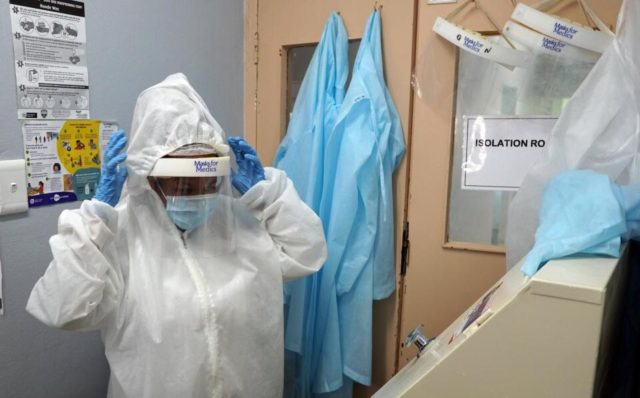All items from PPE to used tissues be doubled bagged before throwing them away, keeping them separate from recyclable waste.
WITH discarded personal protective equipment (PPE) already found dumped in Kimberley, concern has been expressed about the safe and responsible disposal of Covid-19 PPE waste.
Recently a pile of used masks and other PPE waste was found dumped behind a municipal sub-station in Memorial Road.
With Covid-19 arriving in an environment that was already battling plastic pollution and reckless dumping of waste, concern has been expressed about the upsurge in the use and manufacture of PPE for citizens to comply with new regulations related to the pandemic.
Brindha Roberts, head of sustainability at waste management company Averda, said on Wednesday that the public and businesses needed to know that plastic PPE could not be disposed of alongside normal plastic items.
“Non-woven masks, gloves, aprons and gowns are all examples of equipment which are normally single-use and thereafter discarded as a measure to protect against the spread of infection and diseases. These need to be handled as infectious waste and if not disposed of with care, pose a contamination risk to others who are either handling the waste or waste pickers that live off our landfills and dumps,” she said.
Roberts pointed out that until a vaccine was developed, PPE, social-distancing and frequent hand hygiene remained the best shield against the spread of Covid-19.
Roberts advises that all items from PPE to used tissues be doubled bagged before throwing them away, keeping them separate from recyclable waste.
“Businesses should look for guidance from professional waste management service providers, especially those who supply medical waste bins. These companies collect and dispose of the waste safely when the bins are full.”
“We have identified the hazards this waste stream poses to the health and safety of our employees and address the risk by consistently reviewing and adjusting our processes as we learn more about Covid-19,” Roberts said.
Another important consideration, she added, was to look at the different options that are available for dealing with PPE waste and which of these options were least harmful and under which circumstances, such as incineration or treatment before disposal. “It is about the balance between health and safety and environmental concerns created by this waste stream.”
Roberts explained that in South Africa, plastic PPE could be recycled but would need to first be disinfected. “This can be achieved via the electro thermal deactivation process – once this is completed, recyclable materials could be returned to the economy instead of being lost to hazardous landfill sites.
“South Africa is fortunate that it has not yet seen the large volumes of plastic medical waste in public spaces, such as was seen on beaches in Europe. This is mostly because South Africans have tended to use reusable cloth masks as opposed to single-use plastic options,” she said.
“That does not mean we should not take care in how we dispose of our PPE waste or become complacent,” warned Roberts.
“The Covid-19 pandemic is by far the direst crisis in living memory. The consequences on the environment for generations to come should not be overlooked. The health of people and planet are intrinsically connected,” Roberts concluded.








